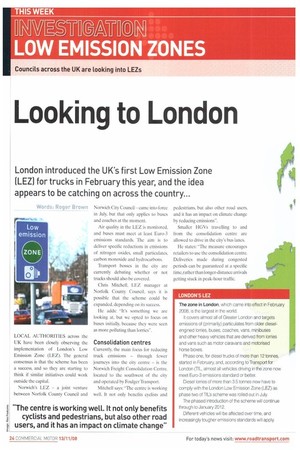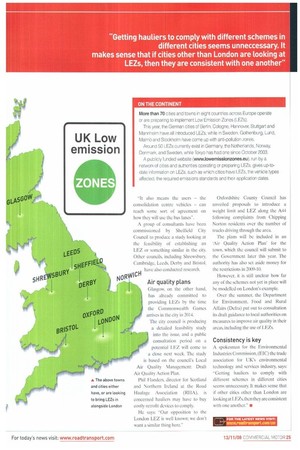Looking to London
Page 24

Page 25

If you've noticed an error in this article please click here to report it so we can fix it.
London introduced the UK's first Low Emission Zone (LEZ) for trucks in February this year, and the idea appears to be catching on across the country...
Words: Roger Brown
LOCAL AUTHORITIES across the UK have been closely observing the implementation of London's Low Emission Zone (LEZ). The general consensus is that the scheme has been a success, and so they are starting to think if similar initiatives could work outside the capital.
Norwich's LEZ — a joint venture between Norfolk County Council and Norwich City Council — came into force in July, but that only applies to buses and coaches at the moment.
Air quality in the LEZ is monitored, and buses must meet at least Euro-3 emissions standards. The aim is to deliver specific reductions in emissions of nitrogen oxides, small particulates, carbon monoxide and hydrocarbons.
Transport bosses in the city are currently debating whether or not trucks should also be covered.
Chris Mitchell, LEZ manager at Norfolk County Council, says it is possible that the scheme could he expanded, depending on its success.
He adds: "It's something we are looking at, but we opted to focus on buses initially, because they were seen as more polluting than lorries".
Consolidation centres
Currently, the main locus for reducing truck emissions — through fewer journeys into the city centre — is the Norwich Freight Consolidation Centre, located to the southwest of the city and operated by Foulger Transport.
Mitchell says: "The centre is working well. It not only benefits cyclists and pedestrians, but also other road users, and it has an impact on climate change by reducing emissions".
Smaller HGVs travelling to and from the consolidation centre are allowed to drive in the city's bus lanes.
He states: "The measure encourages retailers to use the consolidation centre. Deliveries made during congested periods can be guaranteed at a specific time, rather than longer-distance arrivals getting stuck in peak-hour traffic. "It also means the users — the consolidation centre vehicles — can reach some sort of agreement on how they will use the bus lanes".
A group of consultants have been commissioned by Sheffield City Council to produce a study looking at the feasibility of establishing an LEZ or something similar in the city. Other councils, including Shrewsbury, Cambridge, Leeds. Derby and Bristol, have also conducted research.
Air quality plans
Glasgow, on the other hand, has already committed to providing LEZs by the time the Commonwealth Games arrives in the city in 2014.
The city council is producing a detailed feasibility study into the issue, and a public consultation period on a potential LEZ will come to a close next week. The study is based on the council's Local Air Quality Management: Draft Air Quality Action Plan.
Phil Flanders. director for Scotland and Northern Ireland at the Road Haulage Association (RHA), is concerned hauliers may have to buy costly retrofit devices to comply.
He says: "Our opposition to the London LEZ is well known; we don't want a similar thing here." Oxfordshire County Council has unveiled proposals to introduce a weight limit and LEZ along the A44 following complaints from Chipping Norton residents over the number of trucks driving through the area.
The plans will be included in an 'Air Quality Action Plan' for the town, which the council will submit to the Government later this year. The authority has also set aside money for the restrictions in 2009-10.
However, it is still unclear how far any of the schemes not yet in place will be modelled on London's example.
Over the summer, the Department for Environment, Food and Rural Affairs (Deka) put out to consultation its draft guidance to local authorities on measures to improve air quality in their areas, including the use of LEZs.
Consistency is key
A spokesman for the Environmental Industries Commission, (EIC) the trade association for UK's environmental technology and services industry, says: "Getting hauliers to comply with different schemes in different cities seems unnecessary. It makes sense that if other cities other than London are looking at LEZs. then they are consistent with one another."•












































































































































































